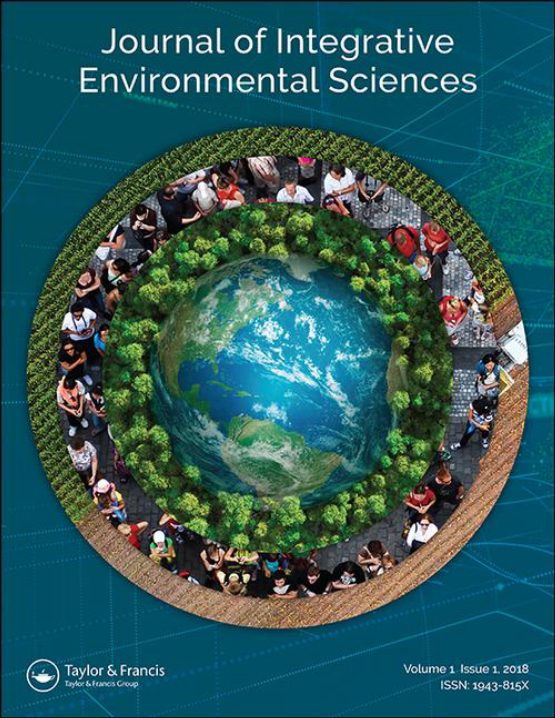Submit a Manuscript to the Journal
Journal of Integrative Environmental Sciences
For an Article Collection on
Co-Creating Transdisciplinary Research and Learning for Transformative Socio-Environmental Change
Manuscript deadline
30 June 2024


Article collection guest advisor(s)
Dr. Jillian Student,
Wageningen University & Research, the Netherlands
[email protected]
Dr. Annisa Triyanti,
Utrecht University, the Netherlands
Dr. Melanie Kryst,
Technische Universität Berlin, Germany
Nadin Gaasch,
Technische Universität Berlin, Germany
Prof. Mark Lemon,
De Montfort University, United Kingdom
Dr. Wim Lambrechts,
Open Universiteit, the Netherlands
Co-Creating Transdisciplinary Research and Learning for Transformative Socio-Environmental Change
Transformative change is necessary for ensuring human well-being while addressing climate change and increasing biodiversity loss. Integrating knowledge is key for dealing with many complex socio-environmental challenges such as mitigating and adapting to climate change, transitioning to a circular economy, and tackling biodiversity loss and environmental degradation. However, for many of these challenges that the sustainable development goals (SDGs) attempts to face, scientific perspectives alone are insufficient:
“The creativity, knowhow, technology and financial resources from all of society is necessary to achieve the SDGs in every context.” - UNDP (https://www.undp.org/sustainable-development-goals)
Societal knowledge is needed to understand and define problems, identify alternatives, evaluate strategies, and design and implement processes. Transdisciplinary collaborations, collaborations that combine diverse societal and scientific knowledge, perspectives and values, provide opportunities to unpack the complexities of the environmental challenges the planet faces.
A variety of cases and good practices of transdisciplinary collaborations are available. For example, multistakeholder issue networks focus on the societal or environmental issues at stake as a benchmark for ascertaining which collaborators to engage with, and consequently, the requisite knowledge essential for addressing the matter. Another approach of learning communities are seen as formal or informal networks in which partners from diverse backgrounds learn, work and innovate together, which ultimately leads to the co-creation of transdisciplinary and transformative knowledge. In such contexts, higher education institutions can bridge the gap between different societal, and foster transdisciplinary learning processes, including the development of competencies and skills that are relevant in tackling societal issues.
Nonetheless, when, how, with whom, and even why we should integrate knowledge to address environmental challenges are not always clear. What are lessons learned from previous environmentally-focused transdisciplinary projects? What are the challenges or possibilities with inter- and transdisciplinary processes (setting up, implementation, evaluation, reflection, continuation and sustainability) for improving biodiversity, environmental justice, and achieving Sustainable Development Goals? These are a few of the questions that emerge when involving diverse types of knowledge and pursuing integration to produce societal impact.
The goal of this collection is to explore how inter- and transdisciplinary learning and research help approach the complexity of these large dynamically entangled societal and environmental issues. This collection follows up on the topics explored during the TRED conference TRED conference 2023: Co-creating space for collaborative research and learning to inspire, interact and integrate held in Wageningen University & Research, in June 2023. We invite contributions that explore transdisciplinary approaches and conceptual frameworks for environmental questions and to address sustainable development in areas such as climate change, disaster risk, biodiversity loss, food and water security, energy and protein transitions, for example papers that:
- find common ground
- collectively determine research questions
- co-design inter- and transdisciplinary research processes
- demonstrate modes of learning inter- and transdisciplinary concepts, skills and competences
- demonstrate transdisciplinary approaches in learning communities
- describe collaboration in multistakeholder issue networks, including power dimensions; co-creation and empowerment of societal partners
- grasp the other mental models, adjust their own, and start to collectively construct new ideas
- show ways of creating safe and welcoming knowledge sharing spaces for inter- and transdisciplinary collaborations
- engage different forms of knowledge in novel and/or creative ways
- consider inclusive, fair, and equitable transdisciplinary collaborations, including through applying post-colonial and decolonisation lens
- show the outcomes of inter- and transdisciplinary research endeavours
- demonstrate and analyse programs that are aimed at supporting and facilitating inter- and transdisciplinary work
- develop integrative expertise or analyse role of integrative experts
- evaluate inter and transdisciplinary processes and outcomes
- communicate findings to different audiences
- consider opportunities for embedding transdisciplinary learning in both education and research activities in universities and knowledge institutions
For the preparation of your manuscript, please use the guide for authors provided by the journal’s editors. Please ensure to select this Article Collection from the drop-down menu when submitting your manuscript.
Please contact Pamela Hohl ([email protected]) with any queries regarding this Article Collection.
Benefits of publishing open access within Taylor & Francis
Global marketing and publicity, ensuring your research reaches the people you want it to.
Article Collections bring together the latest research on hot topics from influential researchers across the globe.
Rigorous peer review for every open access article.
Rapid online publication allowing you to share your work quickly.
Looking to Publish your Research?
Find out how to publish your research open access with Taylor & Francis Group.
Choose open accessSubmission Instructions
All manuscripts submitted to this Article Collection will undergo desk assessment and peer-review as part of our standard editorial process. Guest Advisors for this collection will not be involved in peer-reviewing manuscripts unless they are an existing member of the Editorial Board. Please review the journal Aims and Scope and author submission instructions prior to submitting a manuscript.